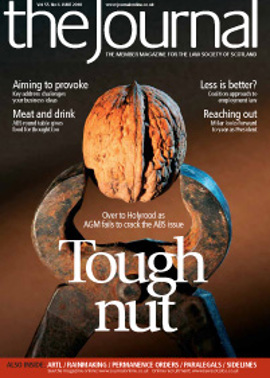Common cause

I didn’t take this job on to be gaining in the popularity stakes.” New President Jamie Millar has seen at first hand the rough ride his predecessor had at times.
At the same time he is not about to shirk the challenge. “I’m not saying it will inevitably happen, but if I have to do things that are for the benefit of the profession, but may not be liked by people, so be it.”
Coming to the post after a year in which the Scottish profession has come close to tearing itself apart over alternative business structures (ABS), yet at the AGM expressed a desire to move forward as one, Millar is keen to help that process.
“My personal goal for this year has to be to try to unite the profession. Deep divisions have arisen, there is no doubt about that. We are a small profession, we should be a small united profession, we can achieve much more as a united profession than we ever can as disparate groups with individual agendas. So I see my biggest task this year as to try and bring everyone together, to work together for a common goal which is the advancement of the solicitor profession in Scotland.”
That may be a little easier now that the second referendum has supported the Society retaining its present dual role, and the AGM has supported, however narrowly, moves towards ABS, enabling the Society to continue to engage with the Government and MSPs over the Legal Services Bill while recognising that there are conflicting views. But what if the Parliament chooses to go further than the profession wants?
“If the Government decides to go for a more extensive form of ABS the Society will have to take account of the views and wishes of its members. If an ABS with 100% external ownership becomes possible, the Society would not seek to regulate a licensed practice which did not satisfy the criteria approved by its membership.” So another regulator would have to look after the 100% external ownership and other models.
More for your money
In fact, Millar is no stranger to facing up to unpopular decisions affecting solicitors. Two years into his Council tenure he became treasurer, to find the Society’s finances in something of a turmoil, with potential deficits and a cash flow crisis. In his first budget he had to persuade the membership to accept an 18% increase in the practising certificate fee.
It seems a long time ago now, but it was just last year that the budget and the PC fee level was the big talking point, with the arguments whether the Society was delivering value for money. Millar states that the Society’s finances have been successfully turned around. “As a result of the budgetary exercise which has taken place over the last four years we have a more rigorous financial regime in place. We’ve been able to achieve stability, to make the Society far more economically sound, and as a result the members have reaped the benefit by the fee being able to come back down to a level where it would have been if we’d simply had inflation increases rather than that huge increase in 2007.”
Given the undercurrent of discontent related to the most recent referendum, does he believe there is more the Society could be doing for the membership?
“Absolutely, we’re still looking at a variety of ways in which the Society can build on what has already been done. I want to ensure that our members are aware of the changes that are taking place and are better supported by new and existing services as a result But, he adds, it is a two-way process. “If the membership can tell us, give us ideas of things they would like the Society to do for it, we will seek to do so, obviously within the constraints of budget and so on. We can’t give every member every desire because one member may want something which the other 10,499 think is unnecessary, but we need to respond to what the membership is looking for, provided that can be done within a reasonable cost.”
Asked whether the referendum campaign has thrown up any targets for action, he replied: “The biggest thing I think we can do is continue with the process of engagement which was started by my predecessors, and we need to make sure that the Society, its office bearers, its Council and its staff are all accessible to the members and respond to their needs.”
Governing considerations
At the same time, the Society is overhauling its constitution, exposed by the recent controversies as capable of leading to anomalous results.
Millar believes that the end result, to be put to members once the Legal Services Bill becomes law, will be a more robust, modern model while still leaving the ultimate control of the Society’s affairs in the hands of Council and retaining the links through Council to the membership. But what of the fears over the influence of more non-lawyers coming onto Council?
“The ratio of non-lawyers to lawyers is still going to leave the profession with a huge majority, so the interests of the profession will still be served by those who are from the profession.
“Having said that, I don’t believe that non-lawyer members do not serve the interests of the profession. We have some very able observers from diverse backgrounds, but the wise counsel that they bring to the deliberations of Council is extremely valuable. I can point to the work of Bronwen Cohen on equality and diversity, the work of Professor Stewart Hamilton in relation to audit and risk management, the work of Graeme Lawson in the area of finance and the work of Sir William Mackay on the new constitution and draft standing orders, and indeed Sir William’s interventions on governance generally have been exceptional. They all bring a fresh look at the work of the Council from people with a different perspective.”
I put it to him also that while the Society may want to get on with the Government and be able to exercise influence, it risks being seen by members as getting too close and failing to stand up for them.
“At the end of the day, the Society’s discussions and negotiations with Government are about achieving what is achievable, and good lawyers will make sure that their clients’ expectations are not raised too high. We must ensure that we do not give our members expectations that we can achieve more than is possible, but equally we must achieve for our members all that is possible.”
And the trick is to be seen to be doing that as well?
“Yes, we need to communicate what we’re doing and communicate our successes, make sure the membership realises that if we promise something and deliver it, that’s what we were able to deliver.
If we say that we can’t deliver something, it’s because we know that we can’t deliver it.”
Coalition approach
Important though the ABS issue is, there remain plenty other matters to occupy the Society over the coming year.
“We’ve got a whole raft of reforms coming along as a consequence of the Gill review. The whole question of access to justice remains a major issue, particularly in relation to availability of legal aid and levels of legal aid fees. Quite apart from anything else, our members are still facing up to the consequences of the recession and that has an impact not only on members’ wellbeing but also on the opportunities for new entrants to the profession” – with universities still turning out graduates and Diploma graduates against a falling number of training places. “These are concerns and issues which we will face and continue to try and address.”
The fact that he succeeds a small-firm lawyer, and is set to be followed by one from the in-house sector, proves to Millar that while the profession operates in very different areas, “we can come together in a common cause and seek common goals that are for the benefit of the entire profession… We’ve all worked on Council, we’ve all worked on the goals that have been set by Council, and these are for the benefit of all our members irrespective of the area of law they practise in and the type or size of practice unit they’re involved in”.
A coalition, perhaps, that reflects what is now happening in the country, as well as Millar’s views of the best approach in the wake of the ABS debate.
“Curiously enough, I see the debate as having parallels with the election and the fact that we have no party with an overall majority and able to govern without support. It’s clear from the numbers that have been voting in the SGM, the referendum, the AGM, that there are large numbers of members on either side of the debate, but equally there is a large number of members who have expressed no opinion, so as I see it there is no overall majority for any view and the way ahead has to be coalition, which means compromise.”
Concluding, he urges solicitors to continue to make their voices heard.
“My message to the membership is that the Society is there for the benefit of the members, the Council is their Council, its members in each constituency represent the people who practise there, but they’re not full time MPs who can go out and hold surgeries, and it would greatly assist members if anyone who’s got issues could contact their Council member.
“All their email addresses and phone numbers are available on the Council members’ page on the website. We need members’ input to enable us to perform the functions that the members want us to.”
Jamie Millar: just the facts
- Graduated from Edinburgh University in 1971 – chose law because he got an unconditional offer for law, his second choice, but only a conditional one for his first preference of languages.
- Trained at Tindal Oatts & Rodger, qualifying in 1973. Became a partner in 1975, first in residential conveyancing, but gradually moving into commercial, and then corporate work. Joined Bishops in 1986, which merged with Brodies in 2006. Moved to Lindsays in May 2010.
- Now works mainly in the SME sector, “helping people build companies for sale”.
- Joined Council in 2004. Treasurer 2006-09; Vice President 2009-10.
- Other interests: theatre, hillwalking, gardening, rugby, and spending time with his two grandchildren.
In this issue
- Embrace "the new lawyer", mediation expert will tell conference
- Best practice governance for family businesses: a new dawn
- Spanning the divide
- Action on Gill review
- A House divided?
- Get it right first time
- Views from the front line
- Push for change
- "If ABSs are the answer, what's the question?"
- Common cause
- Shaping a new life
- Essential artl
- Smart bows out at AGM
- It's the final countdown
- Law reform update
- Ask Ash
- Here comes the rain again...
- True or false?
- Journey's end
- Win some, lose some
- Forget getting paid!
- Thumbs up for Google?
- A sporting result?
- Buying into good causes
- Scottish Solicitors' Discipline Tribunal
- Website review
- Book reviews






